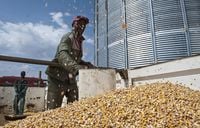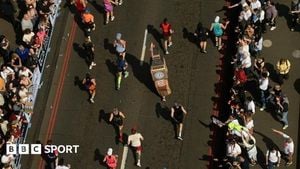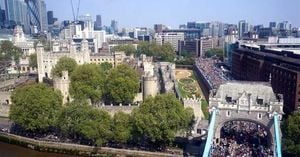South Africans are facing a challenging financial landscape as the 2025 budget presents significant hurdles to taxpayers, particularly those who receive salary increases. According to financial experts, salary rises over 5% could leave many citizens poorer, largely due to the South African Revenue Service (SARS) failing to adjust tax brackets. This situation arises after Finance Minister Enoch Godongwana announced no modifications to tax thresholds, leading to what is termed "bracket creep." In simple terms, individuals earning above inflation-adjusted salary increases will find themselves in higher tax brackets without realizing it.
The South African Reserve Bank projects that inflation is expected to hover around 4.3% in 2025, or as low as 3.6%, which means that any increases in wages above these levels could result in steeper tax obligations for employees. Tanya Tosen, a Tax and Remuneration Specialist at Tax Consulting South Africa, emphasized that a minimum salary hike of 5% is necessary merely for employees to maintain their current spending power.
During a recent webinar organized by the CPD Consortium, Tosen elaborated on the implications for different income groups. For instance, a high earner with an annual salary of R2 million who receives a modest 5.5% increase could end up nearly R7,000 poorer in terms of take-home pay due to the higher tax bracket, while needing a 6.13% raise just to break even. Similarly, an individual earning R360,000 annually who receives a 4.3% raise would see their marginal tax rate soar from 26% to 31%, costing them an extra R4,200 in their Pay As You Earn (PAYE) tax per year.
The public sector is not immune either. Public servants, despite achieving a negotiated 5.5% salary increase for the fiscal year of 2025/26, would also need a 6.13% raise to keep pace with the tax tables, which fails to meet inflation demands. With average salary increases projected to linger between 5.5% and 5.7%, South African employees are aggrieved by the government’s inaction regarding tax bracket adjustments.
But this financial strain is only part of the broader story. In the political arena, the proposed 0.5% increase in Value Added Tax (VAT) poses its own set of challenges. Many deem it “anti-poor,” and its subsequent impact on basic living costs has stirred wide dissent, from political parties to labor unions and economists. Should Parliament reject the budget, President Cyril Ramaphosa would likely face a vote of no confidence that could lead to a general election if members of the ruling African National Congress (ANC) fail to garner sufficient support.
The Democratic Alliance (DA), the Economic Freedom Fighters (EFF), and the uMkhonto weSizwe Party (MKP) have all voiced their opposition to the VAT hike. The Pietermaritzburg Economic Justice and Dignity Group (PMBEJD) has argued that this slight VAT increase will inflate prices on essential goods and services, resulting in adverse effects on economically vulnerable communities. Their Household Affordability Index suggests that the increase, which may only appear small, could amount to an additional R20.41 on a basic basket of goods, affecting overall living costs significantly.
Economist Gugulethu Xaba cautioned that increased costs from VAT will compel businesses to rethink their operations. Unfortunately, this adjustment often means cutting jobs, automating processes, or seeking efficiencies to offset costs rather than absorbing them. Dawie Roodt, chief economist at the Efficient Group, asserted that any tax increase is detrimental to economic performance. This sentiment resonates widely among economic analysts, who highlight the potential consequences for inflation and interest rates, all of which threaten to stifle economic recovery.
If the budget falters, municipalities could face severe liquidity issues by mid-2025, unable to maintain service delivery or staff salaries. By October 2025, certain government departments might deplete their financial resources entirely, intensifying the pressure on lawmakers to avoid a fiscal impasse. Political analyst Dr. Ongama Mtimka emphasized that not passing the budget could lead to dire consequences for the governing coalition. Yet, he noted that there is a realistic chance that parties will compromise to ensure that essential services continue without interruption.
While the struggles and frustrations among the populace paint a harrowing picture, there are complex political dynamics at play. Professor Sipho Seepe asserted that opposition parties will use the budget as a focal point to position the ANC unfavorably in the lead-up to local elections, further complicating the fiscal discourse. Zwelinzima Vavi from the South African Federation of Trade Unions lambasted the VAT increase as a direct affront to poor South Africans, arguing it highlights government inaction on widespread social issues like unemployment.
Additionally, Cosatu’s Matthew Parks lamented that the government's reluctance to adjust income tax brackets would exacerbate the pain inflicted upon working-class families. With stagnant GDP growth projected to stall below the 3% mark required to combat unemployment, mounting pressures are forming on the government to address foundational economic burdens.
Overall, South Africa sits at a severe crossroad, where taxpayers are feeling the pinch of rising costs alongside economic stagnation and political uncertainty. As the fiscal and political battles unfold, the impact of taxation and budget decisions will resonate deeply across all layers of society, leaving many to wonder how the country will navigate these financial challenges moving forward.




